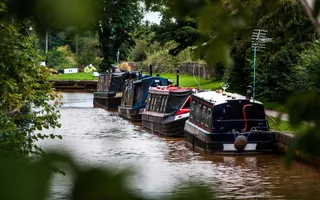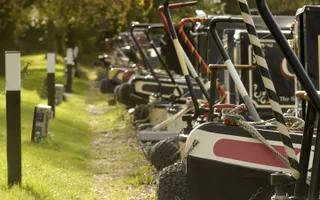Boaters living on the UK’s waterways face significant challenges accessing financial services, medical support, and benefits, according to the our census of boaters on our national canal network. The nation’s largest canal charity is calling on national and local government and others, such as health service providers, to make sure boaters’ needs are met through decision-making, policy and services.
Inclusion and support for canal communities
We're calling on authorities to include the canal network and out liveaboard boaters in:
- Local authorities’ health and wellbeing strategies which for the most part don’t consider travelling boaters.
- Government initiatives to support rural communities, for example the roll out of digital connectivity.
- Marketing and engagement to promote the right to vote, including for those without a fixed abode.
- National support initiatives, for example energy grant support and the covid vaccine rollout.
Additionally, we're calling on authorities to address identified issues:
- Remove barriers to accessing medical care and support needs, including registering at GPs and continuity of care and support for travelling boaters.
- Provide dedicated outreach teams in local authorities to support boating communities.
- Empower carers to access towpaths and boats.
Issues & Challenges Report
The call comes as we published an ‘Issues & Challenges’ Report based on data collected in our first-ever Boater Census. Over 9,500 boaters, just under a third of current boat licence holders, responded to the Boater Census, sharing thousands of comments alongside quantitative data which was published last year.
The most common theme identified the issues created by not having a fixed address, particularly the lack of a postcode. While this was especially problematic for those boats that do not have a permanent place to moor (continuous cruisers*), some boaters with permanent residential moorings also found that their marina or canalside addresses weren’t accepted.
This made accessing a range of services difficult, including registering with GPs, accessing healthcare and financial services, and registering to vote. Applying for school places and arranging travel could also be more difficult for continuous cruisers, while the additional requirements of living on a boat could make it difficult if a boater had caring responsibilities for someone in a fixed location, or if they had health issues themselves.
The Issues & Challenges Report details the rights boaters have, for example being entitled to register to vote, and explains the existing processes and support available. Our range of support options for boaters, including long-term adjustments made under the Equalities Act and shorter-term solutions, are also highlighted. Our welfare team is there to help boaters, including linking them with local authorities, Citizens Advice, the Waterways Chaplains and local charities so they can access the support and benefits to which they are entitled.
Challenges boaters are facing
Matthew Symonds, our head of customer service support, said: “Since their role serving the Industrial Revolution, canals have been populated by boats and boaters. The canals today have changed from their freight-carrying origins and are thriving spaces for leisure boating and recreation. However, as the high cost-of-living continues to affect those across society, we have seen a rise in issues faced by people who have chosen or been forced by circumstance to live on boats, with numbers of continuous cruising boats increasing by five per cent in the past year. We don’t want this community to fall through the net of the support and services to which they are entitled.
“The Boater Census has provided us with hard evidence of the challenges boaters are facing. While our charity provides guidance and a range of support options for those who are struggling, we need the organisations who provide the services – national government, local authorities, doctors’ surgeries, financial service providers, and government departments – to take steps to address the gaps in their provision. We will continue to work with organisations to offer targeted support to boaters, and to advise them on the specific challenges faced by those living afloat.”
Case studies
East Midlands
Alongise West Northamptonshire Council (WNC), we have worked with the boating community and local charities to set up foodbank sessions and other forms of support, including health drop-ins and social events. During the initial pilot, 85 shopping vouchers were given to boaters and many more boaters used the food bank. It was noted that this was as much a social event as it was service provision: this is a community need and will help those facing social isolation. We and WNC are working to continue the sessions and running social inclusion opportunities, such as a book lending library and social events, through volunteers and partners. Targeted outreach for people with disabilities and/or health conditions, which will include transport and logistics, is being considered. A community transport and foodbank resource run by Daventry Football Club will deliver food parcels and enable boaters without transport to go to health appointments and shopping trips. Following a trial of a health bus at the pop-ups, WNC’s outreach team will be approaching GPs along the canal to negotiate buy-in for boaters to access any GP.
Energy Support Scheme
After liveaboard boats without permanent moorings were excluded from the Government’s Energy Support Scheme, we've successfully lobbied the Department for Energy Security and Net Zero to include boaters. We've shared data with the Government department to facilitate payment to over 7,000 liveaboard boaters without home moorings, and the charity’s customer service team dealt with thousands of enquiries from boaters to help them secure their payments. The grant support available adds up to more than £4 million.
Cheshire
Cheshire West & Chester Council (CWAC) contacted the Waterway Chaplaincy to offer service support for the boating community. Working with Cheshire Healthwatch and us, various needs were identified: blood pressure checks; mental health support; social care subscribers; financial awareness and support. We have worked in partnership with CWAC, NHS, and the waterway chaplains to facilitate covid vaccinations for isolated or vulnerable people from the boating community. Additionally, a “Live Well on the Water” event for the boating community took place at Anderton Boat Lift, including representatives from: Cheshire and Wirral Partnership NHS Foundation Trust; social care assessors; Poets in Paint CIC; Citizens Advice; Healthwatch Cheshire; Northwich Primary Care Network; Cheshire Fire and Rescue advocates; Chapter – Mental health.





